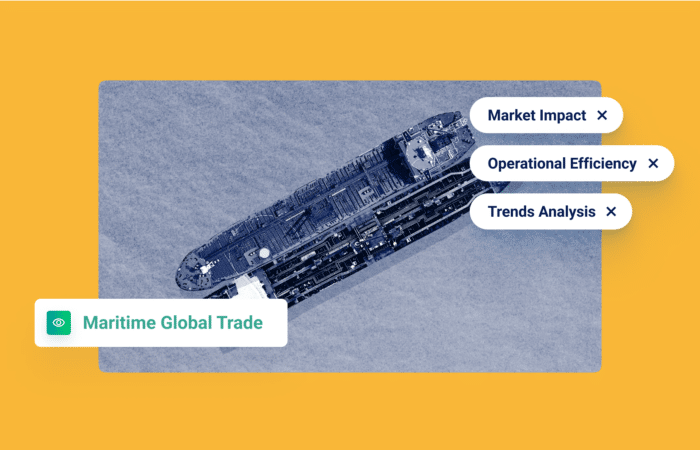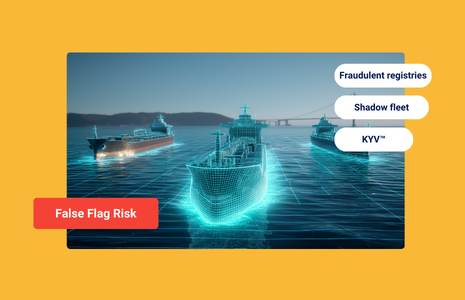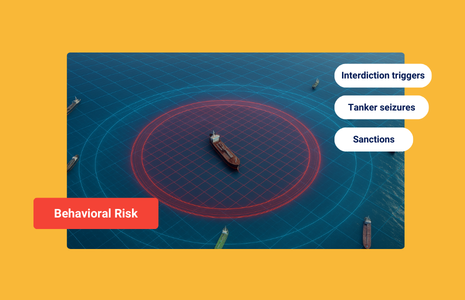Tanker Detained in Gibraltar Reveals New Smuggling Sequence

What’s inside?
A shadow fleet tanker linked to India’s Gatik Ship Management was detained yesterday (Thursday) after its Russian crew alleged they were not paid, according to TradeWinds, a global shipping news source.
This may be the least of the owners’ and crews’ worries. Windward’s risk indicators and AI models revealed that the Electra’s behavior pattern clearly indicates it was likely involved in another illicit activity. Windward used our new Sequence Search capability to shed light on an emerging smuggling pattern involving 65 tankers…
Brief Background
The Electra (IMO: 9307815), a chemical tanker owned by Gatik Ship Management and currently sailing under the flag of Gabon – it previously sailed under the Saint Kitts and Nevis flag – was detained earlier this week following a suspicious ship-to-ship (STS) transfer off the coast of Greece.
The Electra has been flagged as medium risk in the Windward system since February 2023 for its relation to the Russia regime and various other risk indicators, such as port calls in Russia, STS operations with Russian-affiliated vessels, and indicators of suspicious cargo onboard. It is part of the dark fleet, which utilizes dark activities along with deceptive shipping practices (DSPs) to move wet cargo.

How We Got Here…
Electra arrived at Ust Luga in November 2023 and departed Russia in December, after loading cargo – there was a draft change from 7.0 to 10.3. The vessel then sailed to Greece, where it conducted a one-day meeting with another Indian-owned vessel.
After the meeting, the Electra offloaded cargo and departed to Gibraltar, where it was detained, according to TradeWinds.
Despite the reason for detention – the alleged non-payment of workers – the Electra’s behavioral pattern clearly indicates it smuggled oil out of Russia.
New Technology Reveals a New Smuggling Sequence
Sequence Search is a unique way for users to conduct advanced analysis of vessels’ behavioral typologies and trade movements, by searching for a sequence of activities. It helps contextualize the journey and reveals trends and patterns, enabling users to see if route deviations were conducted for security reasons, or for concealing illicit activities.
Based on Electra’s behavior, Windward’s experts utilized the Maritime AI™ platform to check the following sequence of activities:
Port call in Ust Luga > STS in Greece > Area visit to Gibraltar
We found that three of the Gatik Ship Management’s vessels sailed in the exact same pattern. All three of the vessels are currently sailing under the flag of Gabon, and all are flagged as either high or medium risk in the Windward system.
Utilizing Windward’s unique Sequence Search capability, we broadened the query for all tankers that behaved in the same pattern in the last year.
We are pleased to share our AI insights and the trend that was revealed: 65 tankers sailed the same pattern. None of them are Russian-flagged and all are either medium or high risk in the Windward system.

What Did We Learn?
All eyes are obviously on the Red Sea crisis as the Houthi disruptions continue, which has potentially emboldened bad actors in other areas. The already complex maritime and supply chain landscapes continue to get even more complex.
The war between Russia and Ukraine is intensifying and could have a major impact on your organization. The risk for sanctions and inadvertently trading for sanctioned/restricted Russian crude oil or oil products is still high. This could cost an organization many millions.
It’s important to quickly know who you may be trading with, with full visibility into suspicious cargo and ship-to-ship (STS) engagements. STS engagements are often important indicators for various DSPs, such as oil smuggling. Our unique STS model can help.
Predictive analytics and Sequence Search can also help you be proactive and discover fast-evolving DSP patterns and trends in a volatile landscape.
I Want the Platform Producing These Insights!
Trending
- The EU’s 18th Sanctions Package Lookback Started. Trading Russian Products? You're At Risk. Nov 24, 2025
- Tanker Freight Rates Hit Five-Year High Amid Russian Oil Sanctions Shake-Out Nov 6, 2025
- Sanctioned, Stateless, and Still Sailing: Expert Insights from the Frontlines of Maritime Sanctions Nov 3, 2025











